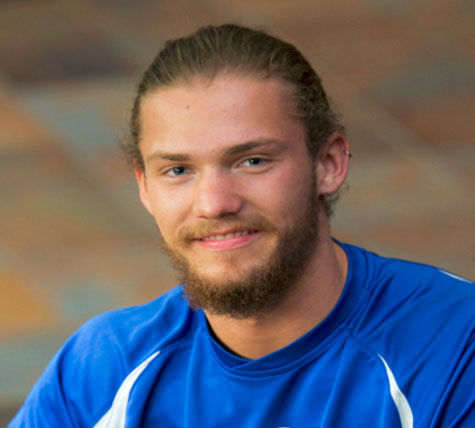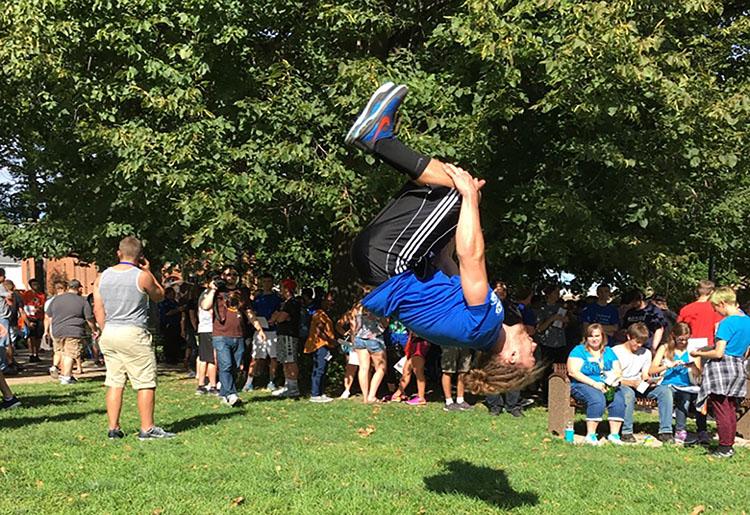The UW-Platteville ratio reversed: nine to one
The only male athlete on cheer and stunt team speaks about his personal experience

Aaron Bakkila
Keep her in the air. Get under the stunt. Make sure her leg is stable. Is she safe?
These are just a few things that run through senior mechanical engineering major Aaron Bakkila’s mind while holding a 100- pound girl above his head. With no prior cheerleading experience, Bakkila has a duty to make sure that everything goes smoothly so no one gets hurt.
Being the only male on the University of Wisconsin-Platteville’s Cheer and Stunt team can have its ups and downs, but for Bakkila it’s mostly ups.
“I haven’t regretted it since I made that decision to join. Fifteen minutes in and I was hooked,” Bakkila said.
Bakkila started his cheerleading career towards the end of his freshman year when he was asked by a coworker to try out. He spent most of that year lifting weights and bulking up for himself. With this newfound strength, he decided to give cheerleading a chance. It only took a short time in the gym to fall in love with the sport, even though it didn’t seem like it at first to others.
“When Aaron first joined the team I wasn’t sure how long he would stick around or if he was even that committed,” head coach for the UW-Platteville Cheer and Stunt team Suraya Strobl said. “By the end of his first year he had come to love the sport and it was apparent.”
With Bakkila showing his love for cheerleading, he has had to deal with stereotypes of him being gay or only being on the team to get closer to women. However, he chooses not to believe in those stereotypes because they’re not always true.
“I always wanted to join in middle school and high school, but I never got the opportunity. I didn’t want to deal with the stereotypes when I was that young. Now, it’s not too bad,” Bakkila said. When he isn’t cheering he is working as a student manager at Kristine’s Café, snowboarding or playing the piano.
Even though Bakkila is the only male on the team he doesn’t let that stop him from pushing himself and his teammates to work harder. However, a difficulty that he has had to overcome is being able to communicate with his female counterparts.
“It’s weird because I grew up playing baseball, basketball [and] tennis. All sports that had crossover. I’ve never been surrounded by so many women. The way I have to talk to them- to not hurt feelings. Women work differently than guys,” Bakkila said. “I have to figure out how to lead on the team and work with them. That’s really difficult for someone who has not had that experience. That’s the only hard part, but it’s also fun because I am the only guy. Everybody wants to be the only guy on the cheer team and I get to do that.” Bakkila improves his communication skills by asking his teammates if he is being harsh with them or if he should change his tone. He likes to think of himself as the “big brother” of the cheer team. Strobl believes that some of his banter makes memorable moments.

Senior male cheerleader Aaron Bakkila shows off his tumbling skills in City Park during UW-Platteville’s welcome weekend. Here he is shown throwing a back tuck.
Although cheerleading can look easy to some people, there is so much more to it than people think. During his first season he never had one set partner to stunt with, so he was constantly learning how to stunt with different people.
Not having a set partner in cheerleading can be difficult because you aren’t able to form chemistry. This challenge taught him how to improve his partner stunting skills while working with a new girl each practice because each flyer performs differently.
“He [Bakkila] is always striving to improve on his basics and push for more elite stunts, taking constructive criticism very well. He wants to improve so much that sometimes I need to step in and tell him he needs to take a step back and work technique before moving on,” Strobl said.
For the 2016 football season, Bakkila has partnered up with sophomore biology major Dayna Hartje. Together the two have worked together perfecting stunts like cupies and pyramids. Currently, they have been working on a rewind (back tuck toss to hands) stunt.
“He [Bakkila] has helped me build up my own skills as a flyer. He has a lot of experience of building up strength and endurance and he really brought that to the team,” Hartje said. The two stunt together outside of their scheduled practices to get better.

Senior mechanical engineering major Aaron Bakkila and sophomore biology major Dayna Hartje do a one man Lib at City Park.
However, just like in any other sport, injuries can and will happen.
“Stunts have fallen horribly. People have stepped on my face, but that’s just part of the sport. Messing up my thumb was the worst. Everything I do is with my hands. If I don’t have grip strength, I can’t do anything,” Bakkila said. Falls are starting to become rare, though. When he and his flyer hit a stunt correctly, he believes that it is a feeling like no other.
Even though Bakkila likes being the only male cheerleader at UW-Platteville, he still wants more men to join the team. The one difficult thing that the cheer team has had in recruiting members is that in order to go to an open gym you have to have a sports physical on file. This can eliminate pursuers because it can cost a large amount of money.
Bakkila believes that if more people were able to have the chance to try cheerleading they would be able to see how it makes them a better athlete. One way that he and Hartje try to recruit athletes is to go into public areas and partner stunt together. They do this in hopes that it will get people interested and see what they can be capable of doing.
“Most males that join the team don’t have prior experience in the cheer world. They have to be coach-able and really take the sport seriously. The importance of overall athletic ability is extremely important because as a cheer and stunt athlete you have to have coordination, strength and flexibility. An athlete, male or female, has to have the ability to measure their strength and know how to use it,” Strobl said.
Bakkila hopes that in the next five years the UW-Platteville Cheer and Stunt team will compete at nationals and becomes a school that people want to come to just for this program.
“Aaron brings a lot of good enthusiasm, excitement and positivity. He wants to see us do well, he wants to see us improve,” Hartje said.
Over the last three years, Bakkila has been able to grow as an athlete a person. He credits these traits to the sport that he fell in love with.
“Cheer has helped me with my communication skills and how I talk with women,” Bakkila said. “It has also made me come out of my shell. Getting into cheerleading gave me an outlet to kind of go nuts and not care what people think of me. At the end of the day does it really matter what people say about me just because I’m a dude cheerleader? No.”



